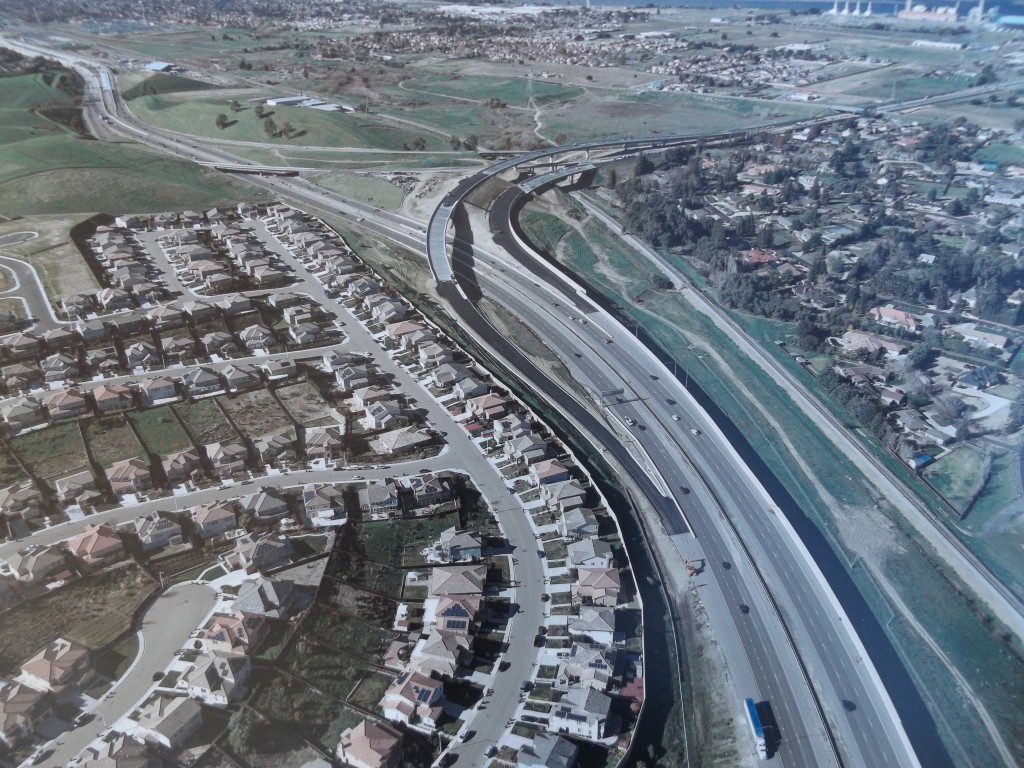
The new Highway 4/Highway 160 ramps, which recently opened in East County, are the latest completed projects of the CCTA. photo courtesy of CCTA
By Allen Payton
The Contra Costa Transportation Authority (CCTA) will discuss and vote on the Draft Measure J 2016 Strategic Plan at its meeting on Wednesday, March 16 at 6:00 p.m. in the authority board room, located at 2999 Oak Road, Suite 100 in Walnut Creek.
Measure J is the county’s half-cent sales tax for transportation, which was passed by voters in 2004. The Plan was last updated in 2013 and this update will last through 2021. Almost half of all money generated by the half-cent sales tax will be spent on projects in East County.
Following are the highlights of the update to the Plan, according to the staff report:
- The Plan makes firm commitments of Measure J funding for specific projects through June 30, 2021. It also reflects actual revenues and expenditures through June 30, 2015.
- Sales tax revenues are now estimated to total $2.72 billion over the life of Measure J. This is approximately $10 million more than the estimated amount in the last Strategic Plan.
- Approximately $725 million is now estimated to be available for Capital Projects through June 30, 2021, or about 85 percent of total Measure J funds programmed for projects in the Plan.
- Due to the slight increase in revenues and lower than anticipated financing costs, the Plan loosens the overall “Expenditure Cap” on Project Categories from 76.2 percent to 76.6 percent.
- The Plan reprograms $9 million from the East County Corridor Reserve (Project 5011) to State Route (SR4)/Balfour Road Interchange (Project 5005), $1.224 million from Marsh Creek Road Upgrade (Project 24001) to Clayton Streets Improvement (New Project 24032), $3.8 million from Alhambra Creek Bridge (Project 24029) to Pacheco Blvd Widening (Projects 23003 & 24003), $437,000 from Camino Pablo Pavement Rehabilitation (Project 24017) to Ivy Drive Pavement Rehabilitation (New Project 24018), and $4.9 million from I-680 Corridor Reserve (Project 8006) to I-680 Carpool Lane Completion (Project 8001). In addition, funding is advanced for several projects throughout the county including Richmond Parkway Maintenance (Project 9002), I-80/Central (Project 7003), BART Station, Access, and Parking Improvements (Project 10002-03), SR4 Operational Improvements (Project 6006), and I-680/SR4 Interchange, Phase 3 (Project 6001).
- In programming additional capacity through the end of Measure J (FY 2034), the Plan adheres to each sub-region’s proportional share of Capital Project Categories in Measure J Expenditure Plan, as follows: Central County (TRANSPAC): 29.8 percent; East County (TRANSPLAN): 48.8 percent; West County (WCCTAC): 8.5 percent and Southwest County (SWAT): 12.8 percent.
- Consistent with the Authority’s strategy to use debt financing to expedite high priority projects, the Plan assumes one additional bond issuance: $95 million in 2018. The Authority will revisit the size and timing of the 2018 bond in future Strategic Plans based on an updated analysis of the Authority’s financial capacity.
- At the request of TRANSPLAN, any Measure J savings realized after the completion of SR4 East widening and eBART will be first redirected to reduce ECCRFFA [Eastern Contra Costa Regional Fee & Financing Authority] commitment on SR4/Balfour Road interchange, which has experienced cost increases and required additional ECCRFFA funding.”
In addition, following the Authority’s Administration & Projects Committee (APC) “meeting on March 3, 2016, BART requested the reprogramming of $250,000 from Transit Oriented Development (TOD) Supporting Improvements at Central County BART Stations (Project 10001-02) to the Shared Autonomous Vehicle Pilot Program (New Project 10001-06).”
The Contra Costa Transportation Authority Board meeting agenda packet for March 16, 2016 is now available by clicking here.
The Draft Measure J 2016 Strategic Plan can be located under Attachment A on the agenda page under APC Item # 2.A.4. (NOTE: This is a large file and may take several minutes to download).
Measure J is the continuation of the half-percent countywide sales tax for transportation, first adopted as Measure C in 1989. The new measure was passed by Contra Costa voters in November 2004. The Measure started on April 1, 2009 and will be in effect through March 31, 2034. The Measure J Strategic Plan guides the timing of Measure J expenditures based on assumptions about future sales tax revenues, debt service costs on proposed bonds, and project schedules. The underlying assumptions in the financial plan and the resultant cash flow estimates are critical to ensuring that the Authority will have the financial resources to deliver its project and program commitments.
Members of the public are welcome to speak on any agenda item during the meeting. Those who can’t attend the meeting, it is scheduled to be audio cast live on the CCTA website on March 16, 2016 at 6:00 p.m. To listen to the audio cast or download the meeting materials, visit the Public Meetings page of their website.
For more information visit www.ccta.org.

Leave a Reply